Reflecting on an insightful first season before preparing for season two
One of the most beautiful lessons I’ve learned over the last few months? Podcasting is so much fun! It enables you to connect with someone, let the conversation flow naturally, and leaves you feeling more energized about the different topics you’ve explored.
Especially when friends and colleagues (who happen to be people you admire) say yes to come on the show and share about what they know, their experiences, what they are learning, and even what they are currently struggling with.
Topic-wise, the first season’s episodes were very diverse. We talked about testing, performance testing, test automation, training, agile development, observability, API testing, testing critical software… We also mentioned tools, methodologies, approaches, and many, many things that I find very useful for testing, development or any other role in the industry.
For me, the podcast was an experiment. Is it worth it doing a podcast about software testing? Would people be interested in that? Would I engage anyone to talk? Will I learn something new?
As I see it, my experiment was successful and we decided to continue on this journey!
I am SO thankful to all of you supporting this idea, which at the end of the day, has two goals, which I want to iterate here:
- First of all, I love to share knowledge, spread voices around
- and second, as I’m from Uruguay, living in California, I want to build bridges between the two hemispheres.
The latter is part of my personal mission, and also Abstracta’s mission: on the one hand, here in the Northern Hemisphere there is a need for talent, for more people to be able to work on amazing projects that will change the world for the better. On the other hand, skilled people in Latin America need more opportunities.
I want to help bridge that gap by providing outsourcing services to companies here in the US for example, with people in Uruguay who are in a very convenient time zone, with great skills and passion about testing, enabling them to also learn and grow from the amazing things happening up here.
Yes, this is my goal here with the podcast, to encourage listeners from both hemispheres to tune in and improve their sense for quality!
I’m quite happy with how the podcast season turned out. We will take a short break and resume with season two in the fall! Until then, I invite you to explore all of the first 12 episodes below!
Episodes Recap
S1 E1 Rob Sabourin
The very first episode featured test consultant, Rob Sabourin. He shared ideas on how to test when you’re under pressure. We’ve all been there, right? These were his five principles of “Just in Time Testing”:
- Purposeful testing, considering that quality is suitability to purpose
- active context listening,
- understand the decision making processes
- triage, which is crucial for aligning testing with priorities and purpose
- and last but not least, we should always know the last best build, this can save your life
If you want to learn more details about the principles, listen to the first interview! Rob’s suggestions are straight to the point, very very practical in the way we approach and strategize our testing when we don’t have enough time, which is basically, most of the time!
S1 E2 Refael Botbol
Then I had a great conversation with my friend, Refael Botbol, about the challenges of performance testing with open source tools. At Abstracta, we’ve been collaborating with Refael and Broadcom in the development of JMeter plugins and other open source initiatives.
Also, we talked about shift-left and shift-right applied to performance testing. It was amazing to listen to Refael mentioning examples of big companies such as Netflix or Google and how they deal with these challenges and what we can learn from them.
S1 E3 Janet Gregory
Next, changing the topic, I had the honor to talk with Janet Gregory about her challenges during this pandemic and how she and her team have had to rethink their workshop on Agile Testing with an online facilitation.
This led us to talk about the importance of finding the right mindset to embrace remote work and creating a structure to your day, in your daily routine, to enhance productivity. Think about it, all the changes you have to face working from home and working with an agile mindset. Well, some of us were already accustomed to that, for others, that implied more changes. In any case, I think we are testing our flexibility and adaptability to change, which at the end of the day, is what agile really means.
S1 E4 Paul-Henri Pillet
Following my interview with Janet, I had the chance to chat with Paul-Henri. He’s not a tester but the CEO of a very popular open source performance testing tool, Gatling.
The conversation had two very different topics, one was about the importance of performance testing and doing it throughout the software development cycle, and the other was more related to the history of Gatling.
Paul-Henri also shared some things he’s learned about leading his team, and so on, which I found fascinating.
S1 E5 Alan Richardson
Next up, I talked with the “Evil Tester” aka Alan Richardson about test automation. How can you learn and experiment with games? Yes, games. Can you automate a game? Can you learn about test automation, trying to beat the machine and be the fastest at the game?
I also loved Alan’s vision about thinking tactically vs strategically about software testing and specifically about test automation, also his view on critical thinking in test automation.
Alan shared many tricks that you can use as workarounds or just to improve your test automation. If you want to learn his tricks, listen to the interview!
S1 E6 Alon Girmonsky
Then Quality Sense had another CEO come to the stage. Alon Girmonsky was not only the co-founder of BlazeMeter, but he’s also working right now on UP9, a platform to allow better testing of micro services.
Alon is also an advisor to Apptim (our sister company in Abstracta), where we’re working hard to provide a tool to test and improve the client side performance of native apps. During the interview, we focused our conversation on the challenges of testing an API and micro services.
S1 E7 Eric Proegler
Next, you may know him for being the president of the association for software testing… I also had the chance to share a nice conversation with Eric Proegler.
We explored how certain industry’s systems are tested like contact tracing apps for COVID-19 and aircraft software. Related to that, we also touched on software quality certifications: whether they are really useful or not.
I also remember that we got a bit sidetracked, but we landed upon a super important skill for testers to learn: how to disagree politely.
S1 E8 Lisa Crispin
Then I talked to Lisa Crispin, another “mother of agile testing,” like Janet Gregory. Lisa provided a great introduction to software observability, which she is diving into at OutSystems.
This is a topic that is becoming more and more relevant lately. It’s concerned with how to get information from production to improve the quality of the product and also the quality of your processes, even testing. Learn more about it listening to the whole conversation with Lisa.
S1 E9 Oren Rubin
Another episode around test automation was the interview with Oren Rubin, CEO and co-founder of Testim. He overwhelmed us with his knowledge of all the different tools and platforms for test automation, their pros and cons, when to consider each, and so on. In particular, Oren mentioned Selenium, Cypress, Playwright and Puppeteer.
We also talked about how AI helps test automation and the difference between script-less testing tools and visual editors for test automation, which seem similar but I assure you that I learned they are not actually the same.
S1 E10 Sofia Palamarchuk
One of the humans I admire the most, my friend and the co-founder of Apptim, Sofia Palamarchuk, joined me to talk about mobile performance and mobile performance testing. There are different aspects to consider: the client side, the network and the server side.
Sofia mentioned how to start paying attention to each component, especially where she has more experience with, in her latest endeavor, which is client side performance, where devs and testers tend to pay less attention.
S1 E11 Michael Bolton
I also had the honor to interview one of the people I’ve learned from the most in software testing, which is Michael Bolton, co-creator of the Rapid Software Testing Methodology.
Michael explained the full story of how he accidentally became a tester… (don’t we all?) and throughout the story, he shared many amazing metaphors that explain the purpose and often the problems with today’s approach to software testing.
Also, if you want to learn more about the two frames of testing that Michael and James Bach have defined, (intention frame and realization frame), check that episode.
S1 E12 Leandro Melendez
In the last episode rounding out the season, I interviewed my Latino friend, Leandro Melendez, also known as “Señor Performo.” Shout out to his podcast, Perfbytes in Español!
Leandro and I visited the most important performance testing concepts. He explains them using very funny metaphors that makes it easier to understand these complex concepts.
I think this episode is a great resource to learn about the basics of performance testing, and if you’re already a performance pro, you’ll learn a great way to be able to explain it.
I’m already coordinating interviews for the second season. My question for you now is, who’s next? Who do you want me to interview? Please, let me know in the comment section or by reaching out on social media.
Recommended for You
Uruguay: The Best Hub for Software Testers in Latin America?
Q&A with Lisa Crispin: BDD & CD


Federico Toledo, Chief Quality Officer at Abstracta
Related Posts
How to Optimize Website Speed for Black Friday
Is your website prepared for record breaking traffic and sales? Before you know it, it will be Black Friday and then, Cyber Monday. These consumer “holidays” bring about the race for shoppers to buy all of the coveted items on their shopping lists before they’re…
Quality Sense Podcast: Refael Botbol – Optimizing Performance Testing Costs
Interviewing a leading expert in performance engineering and open source tools Recently for his Quality Sense Podcast, Federico Toledo interviewed Refael Botbol, the BlazeMeter testing domain expert at Broadcom, where he enables developers to achieve higher-quality applications by injecting testing throughout the software development lifecycle….
Search
Contents








